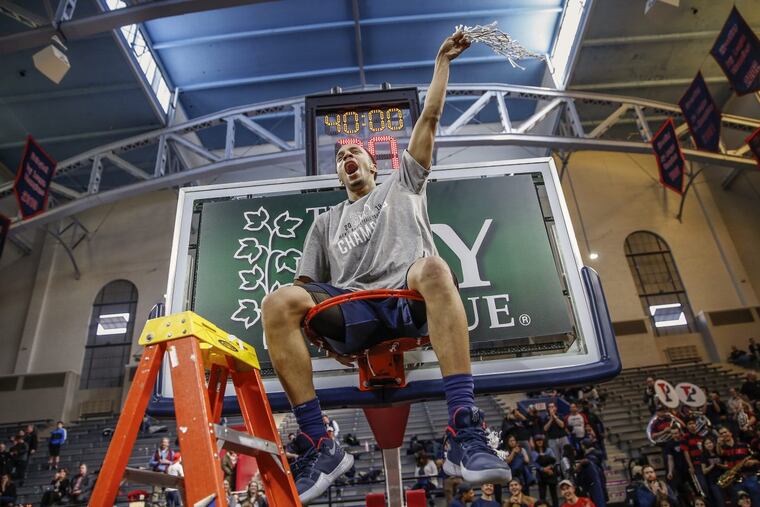Ivy League, ESPN sign 10-year deal for TV and streaming of basketball, football and all sports
The Ivy League on Wednesday announced the most wide-ranging media rights deal in its history: a 10-year pact with ESPN that gives the network full rights to over 1,100 games from the conference's 30-plus varsity sports.

The Ivy League announced Wednesday the most wide-ranging media rights deal in its history: a 10-year pact with ESPN that gives the network full rights to over 1,100 games from the conference's 30-plus varsity sports. The deal will begin at the start of the 2018-19 academic year.
Ivy League executive director Robin Harris told the Inquirer and Daily News that it's the first time ever that one network has held rights to all of the Ivy League's sports.
For the last few years, there has been a jumble of separate TV and streaming deals across ESPN (including the basketball tournaments), NBCSN (just for football), and out-of-the-way channel Eleven Sports. Fox briefly had a small basketball package a few years ago, as did NBCSN. On top of that were TV deals struck by individual schools, and a league-run, league-wide subscription streaming package for everything else.
The subscription service, known most recently as the Ivy League Network, launched in 2013. It has served its purpose, but the conference has aspired to something bigger for a while. The league's effort to find a new media rights partner began in the summer of 2015, and talks with ESPN specifically have been going on for over a year.
Those talks took so long in part because of Disney's purchase of BAMTech, the online streaming company that was a subsidiary of Major League Baseball. That led to the creation of ESPN+, a new multi-sport subscription streaming platform. It will be the home of almost all of the Ivy League's events.
Some marquee games will be shown on traditional television. The TV package includes six football games per season (including Harvard-Yale every year); at least six regular season men's basketball games per season; the men's basketball tournament; the women's basketball tournament final; the men's lacrosse tournament; and a handful of smaller sports events each year.
A package of games will also be streamed on ESPN3, the platform currently available through many internet providers without a further paid subscription.
Games that are broadcast on linear television will not be available live on ESPN+. They will require a TV subscription to watch online, whether through ESPN's website or platforms such as Sling TV or YouTube TV.
Harris said ESPN has been interested in an Ivy League rights package "for some time. But really, until the BAMTech deal, they weren't in a position the way they are now to step forward in the way that they have."
The deal was finished in the last few weeks, with the Ivy League's presidents giving their approval in March.
Within the ESPN deal, schools will also be able to have local television arrangements for games that aren't on ESPN TV channels. Harris said there will be limits on how many games those deals can include. Online streaming of those games will be through ESPN platforms.
"We'll have a good number [of games] annually on regional [television], if our schools choose to do that," Harris said.
She emphasized that those television channels will have to be truly local in nature, which is a change from past policy. Princeton has had its own deal with ESPN since 2005 for a set of games across many sports. That sort of contract won't be possible anymore.
The Ivy League Network branding will remain for online and local television broadcasts. Production responsibilities will remain with staffs run by the schools, and ESPN will lend some expertise.
"We expect to see the quality of our broadcasts and production to increase," Harris said. "That may or may not happen overnight in every sport, but we expect the partnership with ESPN to also be reflected in the quality of our broadcasts."
The existing Ivy League Network platform will go away at the end of June. Harris said the league hasn't figured out yet what will happen to the platform's archive of games. The league's international distribution will move to ESPN streaming platforms in countries where the network runs them. Harris said that for other countries, the league has the right to distribute games itself.
(The Ivy League being what it is, that matters. There are squash and fencing fans in Europe and Canada, along with basketball and football fans.)
ESPN+ is set to launch on April 12, It will cost $4.99 per month or $49.99 per year. That is a big price drop from the Ivy League Network, which costs $15.95 per month or $119.95 per year. A subscription for just one school is $10.95 per month or $119.95 per year.
And ESPN+ will have a vast range of pro and college sports for its one price. Pro offerings include Major League Soccer, PGA Tour golf, boxing, and U.S. Open, Australian Open and Wimbledon tennis matches that aren't on television.
There will also be a Major League Baseball game offered each day, and starting next season, a National Hockey League game offered each day. Both leagues will keep their separate streaming platforms (at least for now), with MLB's platform also available through ESPN+ for $24.99 a month.
There will be some international sports too, including cricket and rugby.
The MLS deal will impact Union fans who want to watch the rest of the league. ESPN+ has exclusive out-of-market streaming rights for every game that isn't nationally televised. Union games will be blacked out, but there's an option for the team to sign a deal to reverse that. The Chicago Fire have already done so in their market.
On the college sports side of things, a dozen conferences are on board with ESPN+, including the Missouri Valley, WAC, America East, Northeast and Metro Atlantic.